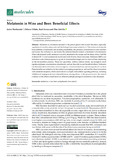Mostrar el registro sencillo del ítem
Melatonin in wine and beer: beneficial effects
| dc.creator | Marhuenda, Javier | es_ES |
| dc.creator | Villaño Valencia, Débora | es_ES |
| dc.creator | Arcusa, Raúl | es_ES |
| dc.creator | Zafrilla, Pilar | es_ES |
| dc.date.accessioned | 2024-03-20T14:34:47Z | |
| dc.date.available | 2024-03-20T14:34:47Z | |
| dc.date.issued | 2021 | |
| dc.identifier.citation | Marhuenda, J., Villaño, D., Arcusa, R., Zafrilla, P. (2021) Melatonin in wine and beer: beneficial effects. Molecules, 26(2), 1-22. https://doi.org/10.3390/molecules26020343. | en |
| dc.identifier.issn | 1420-3049 | |
| dc.identifier.uri | https://hdl.handle.net/2454/47743 | |
| dc.description.abstract | Melatonin is a hormone secreted in the pineal gland with several functions, especially regulation of circadian sleep cycle and the biological processes related to it. This review evaluates the bioavailability of melatonin and resulting metabolites, the presence of melatonin in wine and beer and factors that influence it, and finally the different benefits related to treatment with melatonin. When administered orally, melatonin is mainly absorbed in the rectum and the ileum; it has a half-life of about 0.45–1 h and is extensively inactivated in the liver by phase 2 enzymes. Melatonin (MEL) concentration varies from picograms to ng/mL in fermented beverages such as wine and beer, depending on the fermentation process. These low quantities, within a dietary intake, are enough to reach significant plasma concentrations of melatonin, and are thus able to exert beneficial effects. Melatonin has demonstrated antioxidant, anticarcinogenic, immunomodulatory and neuroprotective actions. These benefits are related to its free radical scavenging properties as well and the direct interaction with melatonin receptors, which are involved in complex intracellular signaling pathways, including inhibition of angiogenesis and cell proliferation, among others. In the present review, the current evidence on the effects of melatonin on different pathophysiological conditions is also discussed. | en |
| dc.format.mimetype | application/pdf | en |
| dc.language.iso | eng | en |
| dc.publisher | MDPI | en |
| dc.relation.ispartof | Molecules 2021, 26(2), 343 | en |
| dc.rights | © 2021 by the authors. Licensee MDPI, Basel, Switzerland. This article is an open access article distributed under the terms and conditions of the Creative Commons Attribution (CC BY) license. | en |
| dc.rights.uri | https:// creativecommons.org/licenses/by/ 4.0/ | |
| dc.subject | Melatonin | en |
| dc.subject | Wine | en |
| dc.subject | Beer | en |
| dc.subject | Polyphenols | en |
| dc.subject | Free radical | en |
| dc.title | Melatonin in wine and beer: beneficial effects | en |
| dc.type | Artículo / Artikulua | es |
| dc.type | info:eu-repo/semantics/article | en |
| dc.date.updated | 2024-03-20T14:23:20Z | |
| dc.contributor.department | Agronomía, Biotecnología y Alimentación | es_ES |
| dc.contributor.department | Agronomia, Bioteknologia eta Elikadura | eu |
| dc.contributor.department | Institute on Innovation and Sustainable Development in Food Chain - ISFOOD | en |
| dc.rights.accessRights | Acceso abierto / Sarbide irekia | es |
| dc.rights.accessRights | info:eu-repo/semantics/openAccess | en |
| dc.identifier.doi | 10.3390/molecules26020343 | |
| dc.relation.publisherversion | https://doi.org/10.3390/molecules26020343 | |
| dc.type.version | Versión publicada / Argitaratu den bertsioa | es |
| dc.type.version | info:eu-repo/semantics/publishedVersion | en |



